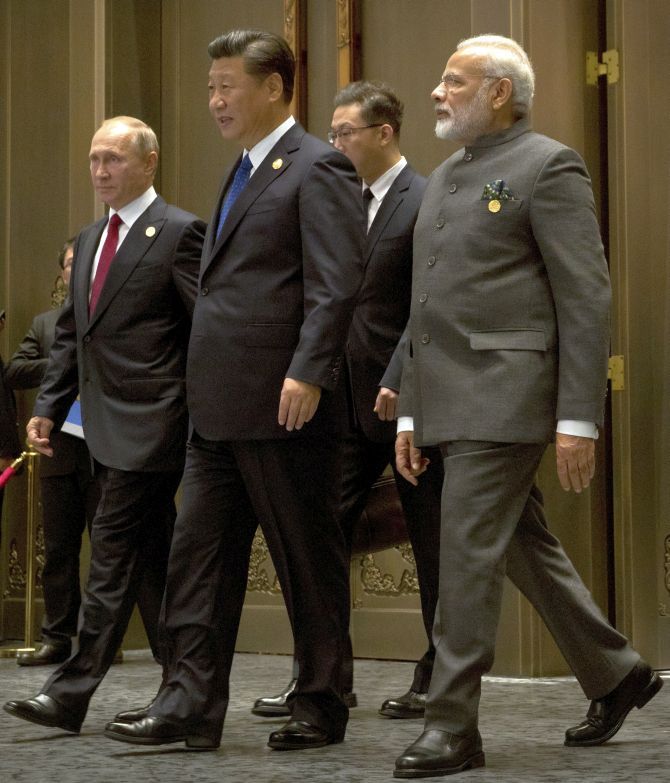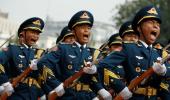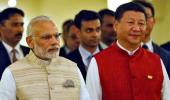'That the two sides allowed such a situation to arise exposed the level of inaction and inefficiency in China-India border management.'
'The Modi-Xi meeting in Xiamen initiated a process to to avert such contingencies in the future.'

Manoranjan Mohanty, honorary fellow at the Institute of Chinese Studies, Delhi, and fellow at the Orfalea Center for Global & International Studies, University of California, Santa Barbara, tells Aditi Phadnis about the challenges facing Chinese President Xi Jinping.
Why was the 19th National Congress of the Communist Party of China so important?
The 19th party congress assumed enormous significance for China and the Xi Jinping leadership, having implications for the evolving global scenario.
Of the two centenaries that are talked about in China today, one is in 2021 when the Communist party will be 100 years old, the other in 2049, the centenary of the founding of the People's Republic of China.
2020 has been earmarked to achieve the doubling of the 2010 gross domestic product and the per capita income and build a 'well-off society in all respects'.
Xi has to achieve this. The doubling is not in doubt, but all Chinese being well off in all respects is.
Relatively low growth rate of GDP at slightly below seven per cent has been accepted as the 'new normal' that was good enough to maintain the growth momentum.
But serious problems of unemployment and distress migration from the countryside persist along with environmental degradation and rising inequalities.
Xi and his new team have to grapple with that.
On the global plane, Xi has many initiatives such as One Belt One Road, the new security doctrine, the notion of humanity with a common destiny, great power relations in the 21st century.
All this has economic and security implications for Asia and the world as a whole.
Xi's political report put his domestic and foreign policy initiatives into one integrated framework. This will be watched with great interest throughout the world.
It appears the standoff on Doklam has been resolved, with India withdrawing its soldiers.
The standoff was linked with the need for Xi to 'save face' in the days leading up to the party congress.
Do you subscribe to this view?
The withdrawal of Indian forces from Doklam, along with stopping of road construction activities by the Chinese on August 28, might have been timed for facilitating a bilateral meeting between Prime Minister Narendra D Modi and Chinese President Xi Jinping on the sidelines of the BRICS meeting in Xiamen on September 5.
Much speculative commentary appeared in the media, linking the Doklam standoff to the People's Liberation Army-Communist party rivalry in China, the Xi regime trying to demonstrate China's authority in the border regions, Xi affirming his standing as the supreme leader in China and so on.
Xi has indeed reshuffled the PLA as his predecessors did to put new leaders under his command. This process has gone on for over a year.
Recently, he replaced the PLA chief of staff General Fang Fenghui with Li Zuocheng.
Similarly, he was named the 'core' of the party leadership at the sixth plenum of the central committee in October 2016.
As for the Doklam situation, leaders of the two countries deployed active diplomacy to defreeze the tense standoff, establish normalcy and carry on their relations at multiple levels.
Not doing that would have been costly for both sides.
That the two sides allowed such a situation to arise in the first place exposed the level of inaction and inefficiency in the China-India border management at present.
It was reported that the summit meeting in Xiamen initiated a process to put in place a more efficient system to avert such contingencies in the future.
Xi will meet several internal challenges head on, including corruption, on which he is said to have read the riot act to the party cadre.
But taking a strong stance could also jeopardise his standing in the party.
What are the signals we should watch out for?
Clean and pro-people governance has been Xi's platform throughout his first term.
His book, The Governance of China, has broken all records in the global circulation of books.
His anti-corruption campaign may have many angles, including purging political rivals and putting corporate heads on a cautious stand and even pushing some business houses out of the country.
But it has created an atmosphere of accountability in public service in China.
The trend of giving his ideas on governance and global initiatives a fresh theoretical status is clearly discernible.
The People's Daily recently ran a people's forum on its pages, where some writers refer to Xi Jinping Thought.
The term, 'Thought' (sixiang), was used only for Mao Zedong, whereas it was Deng Xiaoping Theory, Important Thought of Three Represents of Jiang Zemin and Hu Jintao's Scientific Outlook on Development.
Xi's Four Comprehensives (in relation to reforms, rule of law, strict governance in the party and a well-off society) and the international policy formulations constitute the contours of Xi Jinping Thought at the 19th party congress.
There is a rumour that he may restore Mao's title as chairperson of the Communist party for himself, rather than continuing in the position of general secretary.
Deng's political strategy to build institutions of collective leadership with clear tenures and procedures for succession seems to have been weakened.
Xi has set up a number of special committees with himself as the head, thus centralising considerable power in his own hands.
The OBOR summit that India stayed away from has committed the unequivocal support of several countries to the programme, though they might have been wavering earlier.
However, problems, especially in its financing, continue.
The Chinese have committed close to a trillion dollars for five years.
Funding won't be a problem; actual negotiations on each project and their economic and security implications for the region would be the problem.
India has launched the Asia-Africa Growth Corridor together with Japan. This need not be conceptualised as a rival to OBOR.
In fact, various multilateral initiatives can negotiate interactions and convergence strategies.
That might lend flexibility to the zero-sum position that India has put itself in vis-a-vis OBOR while enabling it to affirm its political and security interests in various cases such as the China-Pakistan Economic Corridor.
IMAGE: Chinese President Xi Jinping and Prime Minister Narendra D Modi, along with Russian President Vladimir Putin, arrive for the Dialogue of Emerging Market and Developing Countries in Xiamen, September 5, 2017. Photograph: Mark Schiefelbein/Pool/Reuters











